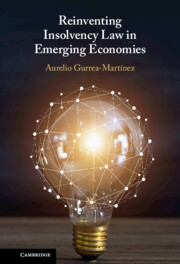Book contents
- Reinventing Insolvency Law in Emerging Economies
- Reinventing Insolvency Law in Emerging Economies
- Copyright page
- Dedication
- Contents
- Figures
- Tables
- Preface
- Acknowledgments
- Table of Cases
- Table of Legislation and Other Instruments
- Abbreviations
- Part I Foundations
- Part II Features and Challenges of Insolvency Law in Emerging Economies
- Part III Towards a New Insolvency Framework in Emerging Economies
- 4 Promotion of Workouts and Hybrid Procedures
- 5 Directors’ Duties in the Zone of Insolvency in Emerging Economies
- 6 Implementation of a Simplified Insolvency Framework for Micro- and Small Enterprises
- 7 Tweaking Ordinary Insolvency Proceedings
- 8 Favoring the Choice of Insolvency Forum
- Part IV The Future of Insolvency Law
- Glossary
- Index
4 - Promotion of Workouts and Hybrid Procedures
from Part III - Towards a New Insolvency Framework in Emerging Economies
Published online by Cambridge University Press: 06 June 2024
- Reinventing Insolvency Law in Emerging Economies
- Reinventing Insolvency Law in Emerging Economies
- Copyright page
- Dedication
- Contents
- Figures
- Tables
- Preface
- Acknowledgments
- Table of Cases
- Table of Legislation and Other Instruments
- Abbreviations
- Part I Foundations
- Part II Features and Challenges of Insolvency Law in Emerging Economies
- Part III Towards a New Insolvency Framework in Emerging Economies
- 4 Promotion of Workouts and Hybrid Procedures
- 5 Directors’ Duties in the Zone of Insolvency in Emerging Economies
- 6 Implementation of a Simplified Insolvency Framework for Micro- and Small Enterprises
- 7 Tweaking Ordinary Insolvency Proceedings
- 8 Favoring the Choice of Insolvency Forum
- Part IV The Future of Insolvency Law
- Glossary
- Index
Summary
This chapter explains why the promotion of workouts and hybrid procedures can be particularly desirable in countries with inefficient insolvency proceedings, as it generally occurs in emerging economies. Moreover, due to the concentrated debt structures that firms usually have in emerging economies, reaching an out-of-court solution can be a more feasible option for viable but financially distressed firms. Nonetheless, informal workouts are subject to many limitations. For that reason, in addition to implementing several strategies to actively promote informal workouts, this chapter argues that emerging economies should adopt enhanced workouts where the support of certain norms or actors can facilitate a successful out-of-court restructuring. Additionally, it is argued that emerging economies should also implement hybrid procedures equipped with several tools existing in formal reorganization procedures. Nonetheless, due to the institutional weaknesses existing in emerging economies, the involvement of courts should be minimized. This chapter explains how this goal can be achieved while making sure that creditors remain protected against the opportunism of debtors.
Keywords
- Type
- Chapter
- Information
- Reinventing Insolvency Law in Emerging Economies , pp. 125 - 149Publisher: Cambridge University PressPrint publication year: 2024

